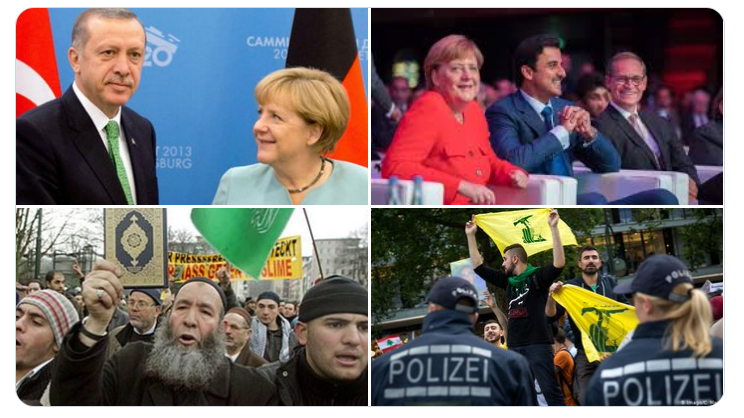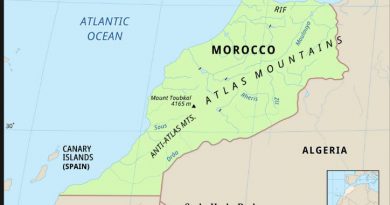Money Rules: The diabolical partnership between Germany, Qatar, Turkey, the Muslim Brotherhood
by Khaled Hamoud Alshareef
A lot of questions should be addressed, did German intelligence participate, with knowledge or without knowledge in the Middle East assassinations carried out by the Muslim Brotherhood…
German policy towards the Muslim Brotherhood, Hezbollah and the Takfiri groups has included an internal dimension and external dimensions since the arrival of the first group of the Brotherhood leaders to Germany during the 1950s.
There is no doubt that German policymakers did not see a problem in bringing these bloody people to their lands and adopting hidden relationships with them until recently bringing them to public strengthening their alliance with political Islamists extremists leaders.
At the beginning political Islamists were not recognized as partners in German foreign policy until achieving their success in the Arab Spring and assuming power. In Tunisia and Egypt in 2011, the subsequent empowerment of Islamists made it clear that Berlin no longer wanted to conceal its relationship with political Islamists anymore.
Germany’s policy towards political Islam passed through three stages. In the first phase, which lasted from the late 1950s to 1979, relations were shaped by the severe lack of employment for this group due to their crushing loss at the hands of Nasser.
Interest in the Brotherhood and contacts with them were largely restricted to the intelligence services to ensure that they did not deviate from the roles assigned to them in aiding of German intelligence agendas in the Arab and Muslim countries.
The Islamic Revolution of Iran in 1979 accelerated the provision of some space for the Muslim Brotherhood to go to the Arab world and to employ their leaderships in the Middle East to rein in the revolutionary regime coming from France, so that they could understand their orientations and find ways of partnership with the Iranian regime, with whom they were successful in 2015 with the signing of the Iranian nuclear agreement.
Turkey and the Islamist movements and the Muslim Brotherhood with Nazi roots have always received attention from the German government, although many policymakers did not realize the importance of this and failed in exploiting it as the Germans did and are doing.
The allies of the past are the allies of today and they are the allies of tomorrow, and while Western countries viewed Islamism to a large extent as a backward-oriented movement that would not play any major role in the future of the Arab and Islamic worlds. Yet that didn’t stop them from perusing a deep and complex relationship that had to be kept in the dark.
As a result, even after 1979, the German intelligence services were still responsible for the few contacts with the Muslim Brotherhood.
There are matters that raise doubts and looming questions. A lot of questions should be addressed, did German intelligence participate, with knowledge or without knowledge in the Middle East assassinations carried out by the Muslim Brotherhood, among these assassinations was the assassination of former Egyptian president Anwar Sadat?
The main culprit in Sadat’s assassination was Khalid Islamboli, his family is of Ottoman Turkish ancestry.
The relationship of the international organization of the Muslim Brotherhood and the German government entered a period of qualitative calm due to the events of September 11 attacks, that led to Washington pressuring Germany to take a stance at their ties with the Brotherhood, as well as other Islamic organizations.
In parallel, the German Foreign Ministry decided to assign its ties with the Islamist to the newly created department of cultural affairs by establishing contacts with a diverse group of Muslim activists around the world, including the Muslim Brotherhood in the Middle East, it appears as a process of normalizing the Brotherhood and integrating it into German society and politics was underway .
However, the official policy remained in public, rejecting all contacts with the Muslim Brotherhood, and the German government increased its support for the ruling powers in the Arab world in order to improve its outlook on America’s war against terrorism.
That role continued until the Western policy compass changed and the rise of an American leftist movement in 2011, and it became clear that Germany would play a major role in the so-called transformation countries in the Arab world and reshaping the Middle East, especially in Tunisia and Egypt, and giving Turkey a role. As the pivotal leadership for all Muslims.
The country had to put in place a completely new policy towards the integration of the Islamists. This third stage, which began after the Arab Spring, is a phase of cautious engagement and integration of those fleeing the hell of Middle Eastern wars into German society, as Germany interacted, pragmatically with the new facts. It abandoned the previous policies of caution and accepted the political roles that the Muslim Brotherhood played now or were about to take on when it exited 3 to 5 billion dollars during the first months of the Syrian Civil War in neighboring countries, most of which went to Turkey and Germany.
Some justify the position of Germany’s openness to the policies of the Muslim Brotherhood that reached it, and Turkey’s capital. The Syrian, Tunisian, Egyptian, and Libyan departing capitals reached more than 100 billion dollars.
The year 2011 was impressive, as the unemployment rate in Germany declined dramatically, reaching its lowest levels in nearly two decades, according to the statistics of the Federal Labor Office. The level of optimism for 2011 rose to be amazing in consumer confidence the growing volume of employment, and the bridging of the labor deficit that lasted until 2010.
Another questionable thing is what Germany justified by paying ransoms of 20 billion euros in the form of economic aid to Iraq in exchange for saving 60 German ISIS members detained there raises so many exclamations, why does Germany spare 60 terrorists? Why this huge amount while it was possible to achieve all the bombings in Berlin with the direct mediation of Iran.
All these questions did not find answers, but the pace of integration of Islamists in Germany continued by allowing Qatar and Turkey to build mosques or social centers that contain immigrants and refugees, and to adapt them to a German version of extremist political Islam in harmony with popular socialism and the extreme left.
A German newspaper published a news that the Brotherhood was in Germany, thus Qatar is building a religious state in Europe, revealing information that reached the Malbrunot mailbox with a storage memory containing thousands of confidential documents, e-mails, bank transfers and lists of donors from the Qatar Charity Organization.
The Qatar Charitable Foundation had funded about 140 mosques and Islamic centers by about 72 million euros, and although the Turkish association “Deiet”, which manages most mosques in Germany under the influence of Turkish President Erdogan, were granted Germany entry visas to about 350 imams affiliated with the association to work in the country’s mosques.
Concerning the Libyan front, Germany is looking forward to its share of the Libyan pie, as the battle for control of Libya was in its stages or so they thought. And the recent position of the German government from the reckless Turkish policy in the Middle East and Mediterranean is yet another proof of how far gone the German policies are gone into favoring Turkish, Qatari madness and empowering the Erdogan regime.
Khaled Homoud Alshareef holds PhD in Business and he earned Masters in Philosophy. He often writes about Islamism, Islamist factions and modern Terrorism. He tweets under @0khalodi0.



